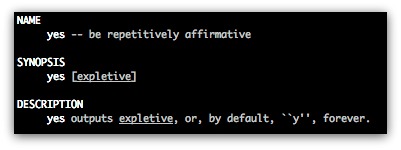Unix Yes
Using Term2, I was looking around some files in the /usr/bin folder to see if there's any cool command line graphic utilities that I could use. In Mac OS X El Capitan (10.11.1) there are 1,052 unix applications in the /usr/bin folder. Many of them I'll probably never use. For example, Why would I ever use eMacs when I have BBEdit?
I did encounter a strange program called 'yes' which sounded weird for a application file name. I checked the description in the manual (man yes) it says that:

yes outputs expletive, or, by default, ``y'', forever.
Turns out that's all the application does. So if you type in:
yes testing
You get the word 'testing' on a single line repeated forever. What is the purpose of this application? Why would anyone need to have a phrase repeated endlessly?
A few people have pointed out that it's useful when you encounter a application where you are prompt to fix an error repeatedly. Another user points out that the 'yes' command is useful when you need to test high loads of CPU on a system.
The most useful that I encountered is if you wanted to delete a bunch of files and didn't want to bother saying 'yes' on each state:
yes | rm *.txt
To me it seems to be a weird unix application that encountered.
Largest Files in /usr/bin
While going through all the other applications in the /usr/bin folder, I was thinking what were the largest applications in the directory. So here is the list of the top 20 largest files in the /usr/bin folder:
| 36M | emacs | |
| 10M | php | |
| 5.4M | parl5.18 | |
| 5.2M | parl5.16 | |
| 3.1M | emacs-undumped | |
| 2.1M | db_printlog | |
| 2.1M | db_codegen | |
| 2.1M | db_load | |
| 2.1M | db_hotbackup | |
| 2.1M | db_recover | |
| 2.1M | db_dump | |
| 2.1M | db_checkpoint | |
| 2.1M | db_deadlock | |
| 2.1M | db_archive | |
| 2.1M | db_upgrade | |
| 2.1M | db_verify | |
| 2.1M | db_stat | |
| 1.6M | ssh | |
| 1.5M | dig | |
| 1.5M | host |
You can easily get this information by typing in the following command in Terminal:
ls -lahS
That will get you the listing of all the files in the current directory, sorted by file size. The file size are in blocks which is a bit easier to read for most people. Would you rather see 36M or 37236368?
